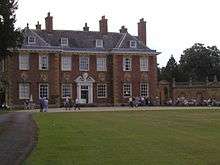Frederick Townsend (MP for Stratford-on-Avon)
Frederick Townsend, FLS (5 December 1822 – 16 December 1905) was a British botanist and Conservative politician who served as an Member of Parliament for six years[1][2] The standard author abbreviation F.Towns. is used to indicate this person as the author when citing a botanical name.[3]
Frederick Townsend | |
|---|---|
| Member of Parliament for Stratford-on-Avon | |
| In office 1 July 1886 – 4 July 1892 | |
| Preceded by | Lord William Compton |
| Succeeded by | Algernon Freeman-Mitford |
| Personal details | |
| Born | 5 December 1822 Rawmarsh, South Yorkshire |
| Died | 16 December 1905 Cimiez, Nice |
| Citizenship | British |
| Political party | Conservative |
| Education | Harrow School |
| Alma mater | Trinity College, Cambridge |
Early life & education
Townsend was born in Rawmarsh, South Yorkshire to Rev. Edward James Townsend, a Church of England clergyman, whose parish was first Rawmarsh and then Ilmington near Stratford-on-Avon. Frederick was educated at Harrow and went on to study at Trinity College, Cambridge, where he gained a BA in 1850 and then an MA in 1855.[2]
He was a respected amateur botanist and was elected a Fellow of the Botanical Society of Edinburgh in 1846 and as a Fellow of the Linnean Society in 1878. After living in Hampshire for several years he published the "Flora of Hampshire" in 1883.[4] He was a friend to fellow botanists Cardale Babington and William Williamson Newbould. He was especially close to Newbould until his death in 1886.[2]
Parliamentary career
Townsend entered Parliament as MP for Stratford-on-Avon as a result of the 1886 general election in which the Conservative Marquess of Salisbury became Prime Minister, ousting the Liberal leader, William Gladstone. He defeated the incumbent Liberal MP, Lord William Compton, with a majority of 489 votes. The constituency has only once elected a non-Conservative candidate since then.
His first recorded contribution in the House of Commons was on the 7 May 1888 and was in regards to the Excise Duties (Local Purposes) Bill; he asked the then Chancellor of the Exchequer, George Goschen, whether a steam ploughing engine which was only used for agricultural purposes, and thus only travelled by road from the owner's home to their field or from field to field, would be exempt from the £5 duty on locomotives.[1]
Townsend did not stand for re-election in the 1892 general election and so was succeeded by fellow Conservative Algernon Freeman-Mitford.[5]
Personal life

In 1863 he married Mary Elizabeth Butler.[2]
As a result of the death of his uncle in 1874, Rev. H. Townsend, he inherited the family estate, Honington Hall, Warwickshire.[2]
He died on the 16 December 1905 in Cimiez, Nice.[2]
References
- "Mr Frederick Townsend (Hansard)". api.parliament.uk. Retrieved 2019-09-12.
- "Frederick Townsend - Wiki". herbariaunited.org. Retrieved 2019-09-12.
- IPNI. F.Towns.
- Journal of Botany-British and Foreign. p. 118.
- "Stratford-on-Avon (UK Parliament constituency)", Wikipedia, 2019-07-22, retrieved 2019-09-12
External links
Hansard 1803–2005: contributions in Parliament by Frederick Townsend
| Parliament of the United Kingdom | ||
|---|---|---|
| Preceded by Lord William Compton |
Member of Parliament for Stratford-on-Avon 1886–1892 |
Succeeded by Algernon Freeman-Mitford |